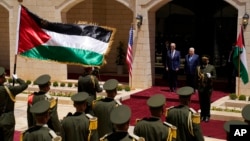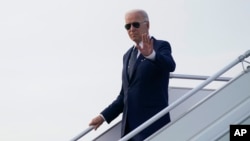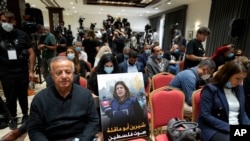U.S. President Joe Biden is in Jeddah, Saudi Arabia, the last leg of his trip to the Middle East, flying directly from Tel Aviv on Friday just hours after the Saudi Kingdom announced the opening of its airspace to “all carriers,” ending the country’s ban on flights to and from Israel.
The decision is a gesture from Riyadh as part of a broader warming of relations between Israel and the Arab world as they align against the threat from Iran. Biden is claiming it to be the result of his administration’s push toward a more integrated and stable Middle East region.
“While this opening has long been discussed, now, thanks to months of steady diplomacy between my Administration and Saudi Arabia, it is finally a reality. Today, I will be the first president of the United States to fly from Israel to Jeddah, Saudi Arabia,” Biden said in a statement.
Biden said the Saudi decision can “help build momentum toward Israel’s further integration into the region,” including with the kingdom itself – hinting at a potential diplomatic normalization that would be the most significant expansion of the Trump era Abraham Accords.
At the same time, his administration sought to repair ties with the Palestinians, offering economic and technical assistance as he met with President Mahmoud Abbas, head of the Palestinian Authority, in Bethlehem on Friday.
The 2020 Abraham Accords normalized relations between Israel and Gulf state neighbors United Arab Emirates and Bahrain, as well as Sudan and Morocco. Palestinians say their statehood cause is sidelined by the deal, as Arab nations no longer withheld diplomatic relations seeking to pressure Israel to negotiate a two-state solution and improve its treatment of Palestinians in the territories it occupies.
Under the 2002 Arab Peace Initiative, Arab nations led by Saudi Arabia conditioned normalization of relations with Israel upon “the acceptance of the establishment of a sovereign independent Palestinian state on the Palestinian territories occupied since June 4, 1967, in the West Bank and Gaza Strip, with East Jerusalem as its capital.”
Two-state solution
Receiving Biden at his presidential compound in Bethlehem, Abbas urged Biden to support the two-state solution to end the Israeli-Palestinian conflict based on the “1967 borders” – a common reference to the 1949 Armistice Agreements that set demarcation lines after the 1948 Arab-Israeli war.
“Mr. President, after 74 years of the Nakba displacement and occupation, isn't it time for this occupation to end?” the Palestinian leader said in his joint appearance with Biden.
Biden reiterated his support for Palestinian statehood, acknowledging what he called the “indignities” that Palestinians must endure, including travel restrictions enforced by Israeli authorities and the “daily worry of your children’s safety.”
“The Palestinian people are hurting now,” Biden said. “You can feel – you can just feel it, your grief and frustration. In the United States, we can feel it.”
He did not, however, offer a peace plan.
“Even if the ground is not ripe at this moment to restart negotiations, the United States and my administration will not give up on trying to bring the Palestinians and Israelis and both sides closer together,” he said.
Biden did not criticize Israeli settlement expansion, nor did he announce the reopening of the U.S. consulate in Jerusalem that served as the American mission to the Palestinians, reopening of the Palestine Liberation Organization office in Washington, and removing the PLO from the U.S. State Department’s Foreign Terrorist Organizations list – demands that Abbas repeated in his remarks.
As his administration pushes for deeper security and economic ties between Israel and its Arab neighbors, Biden suggested harnessing “that same momentum to reinvigorate the peace process between the Palestinian people and the Israelis.”
The Biden administration’s main goal is “keeping open the possibility in future of a two-state solution and managing the conflict so that it doesn't explode,” said Jonathan Rynhold, head of the Political Studies Department at Bar Ilan University, to VOA.
In a statement, Biden reiterated the U.S. position that Jerusalem is the capital of Israel, and boundaries of sovereignty in Jerusalem must be resolved through final status negotiations between Israelis and Palestinians.
Rynhold said the Biden administration and Israeli government are on the same page - neither believes there is a serious opportunity for a diplomatic breakthrough on the Israeli-Palestinian conflict.
Renewing US–Palestinian ties
Biden unveiled a fresh package of economic and technical assistance for the Palestinian people, including funding to support hospitals in East Jerusalem as part of a multiyear commitment aimed at helping Palestinian health services.
"Today I'm pleased to announce the United States is committing an additional $100 million to support these hospitals, your staffs that work for the Palestinian people," Biden said during remarks from the Augusta Victoria Hospital in East Jerusalem.
Last year his administration resumed $235 million in U.S. assistance to the Palestinians, including to the United Nations Relief and Works Agency for Palestine Refugees (UNRWA), nearly all of which had been eliminated by former president Donald Trump. On Friday, Biden announced an additional $201 million for the agency to continue delivering services to Palestinian refugees in the West Bank, Gaza, Jordan, Lebanon, and Syria.
Other announcements include initiatives focusing on Palestinian economic development, such as developing 4G wireless networks in Gaza and the West Bank, and working with Israelis to loosen travel restrictions from the West Bank to Jordan.
But “other than his rhetoric,” in the eyes of the Palestinian public, Biden is no different than his predecessor, Donald Trump, according to Ghassan Khatib, lecturer at Birzeit University and former Palestinian Authority official.
“Biden is trying to make it up by replacing political obligations with financial, which is disappointing to Palestinians,” Khatib told VOA.
Shireen Abu Akleh
Abbas also demanded accountability for the death of Palestinian American journalist, Shireen Abu Akleh, who was shot in May as she covered an arrest operation by Israeli Security Forces and clashes at the Jenin refugee camp in the northern occupied West Bank.
The Biden administration is accused of trying to shield Israel from taking full responsibility for Akleh’s death. An investigation overseen by American and international experts concluded that gunfire from the Israeli Defense Force positions “was likely responsible” but they “found no reason to believe that this was intentional.”
Akleh, a U.S. citizen, was performing “vital work of democracy” and her death is “an enormous loss to the essential work of sharing with the world the story of the Palestinian people,” Biden said, mispronouncing the journalist’s name as “Alkehli.”
“The United States will continue to insist on a full and transparent accounting of her death, and we will continue to stand up for media freedom everywhere in the world,” Biden said.
At the joint Abbas-Biden press conference, reporters left an empty chair with a poster of the slain journalist in her honor. Her family has demanded to meet with Biden while he is in the region, but no meeting has been scheduled so far.
U.S. Secretary of State Anthony Blinken has spoken with her family and invited them to Washington, according to U.S. National Security Adviser Jake Sullivan.







